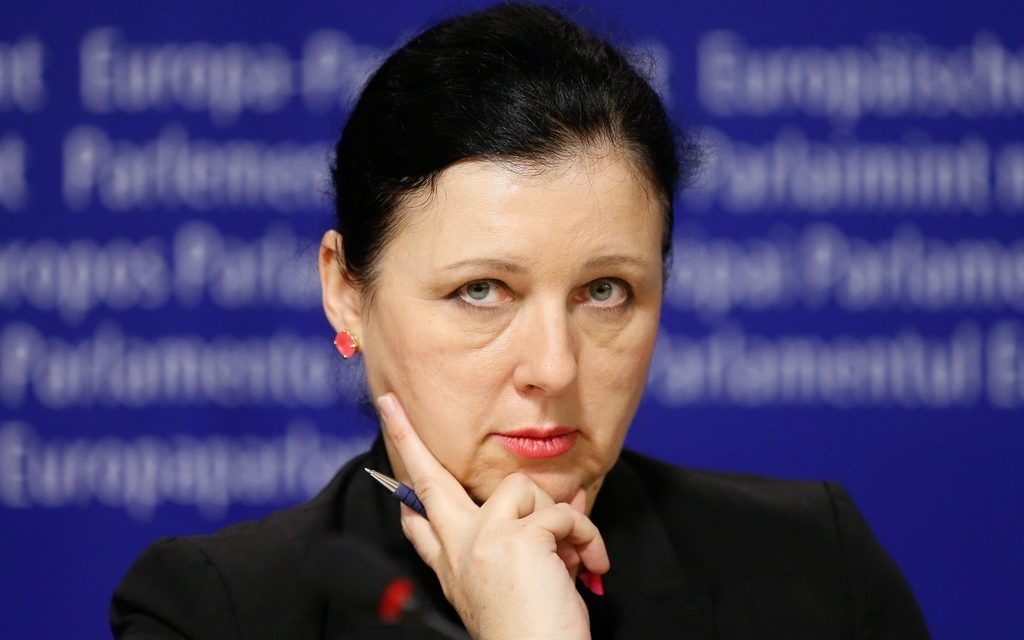Commission Vice President Vera Jourová stated in an interview a few days ago: she is determined that the European Commission enforces the mechanism. To this end, he also mentioned the freezing of EU budget subsidies as a possibility for member states that, in his opinion, violate their obligations. The EU commissioner responsible for values and transparency practically threatened some Central European countries with this.
Meanwhile, the European Parliament with its left-liberal-green majority is putting pressure on the Commission to deploy the rule of law weapon against Hungary and Poland as soon as possible. In the draft resolution adopted by the Parliament, the main political groups call on the body led by Ursula von der Leyen to initiate the rule of law mechanism established last year. If the Commission does not act by June 1, Parliament will consider submitting the mechanism to the European Court of Justice, the draft states.
The move clearly indicates the situation the left-liberal-influenced institutional system has found itself in. The possibility of a lawsuit before the European Court of Justice in the case may indeed push the Commission to take certain steps. The Parliament might just have the Luxembourg forum examine the compatibility of the mechanism with EU law (requesting a legal interpretation), but it is also possible that they would use a stronger tool. With a complaint of default, the Commission itself could be targeted, citing that the body failed to activate the mechanism in time; in this case, either individual member state governments or other EU institutions – in this case the Parliament – could file a complaint against the Commission at the European Court of Justice. Because if we correctly interpret the blackmail attempt typical of the left, they would even be able to generate inter-institutional tension.
Of course, it is not the first time that the principled friends of the holder of the portfolio of values and transparency in Brussels have kicked the most basic principles of the fairness of negotiation processes. Although the heads of state and government of the member states agreed in the European Council last summer that the EU could take action in the event of damage to its fundamental financial interests, in violation of this, the German presidency still wanted to push through in the autumn that EU funds connect its payment with rule of law (i.e. political!) issues. However, after the Hungarian and Polish governments put the prospect of vetoing the seven-year budget and the recovery rescue package, a compromise was finally reached that the application of the mechanism would be suspended until the European Court of Justice examines the legal objections of the two Central European states.
In the face of Jourová's threats, Hungary and Poland firmly defend their sovereign political interests even in the middle of the epidemic crisis, and on March 11, 2021 - shortly before the deadline - they filed a lawsuit at the European Court of Justice. The domestic and international left obviously does not like the fact that this could delay the application of the rule of law mechanism for months. On the one hand, the left-liberal majority of the EP is of course trying to state that last year's agreement is only a political statement, i.e. they have no real legal weapon in their hands, but this is contradicted by the fact that the left, the Greens, liberals and Christian Democrats also emphasize in the resolution that the Hungarian and a Polish lawsuit will not have a suspensive effect - that is, it will still be seen as a legal instrument that can be used. Therefore, they urge the Commission to start using the mechanism as soon as possible.
However, there is an important basic principle in law, the presumption of innocence, according to which no one can be considered guilty or a rule breaker until their responsibility according to legal norms has been established by a final decision of a judicial authority.
But Jourová and many others in the EP also forget about legal certainty, i.e. the predictability of the functioning of legal institutions. Because the EU regulation affecting the conditions of the community budget violates the principle of guarantees of legal certainty in almost every respect, and its implementation would only increase uncertainty within the community. The constant threat of the "rule of law" would not strengthen European unity, but division. The political consideration presents a double standard of a constructive legal institution and an ideologically based one, which would shake the trust in the institutions of the EU and ultimately endanger the survival of the community. Is this really what Jourová and other left-liberal executives in Brussels want?
Jourová has proven on several occasions that she has become unworthy of the position she holds - a politician who harbors hatred for all countries and nations whose voters do not vote for the forces she likes - and those preferred by her international clients - with their confidence in the elections. If there is trust, then it can be stated that the Czech politician, who also functions as the Commission's vice-president, is not a statue of reliability, since the fact that she was arrested at the Prague airport in 2006 on suspicion of corruption casts a bad light on her, since, according to the accusation, as the Czech government's deputy secretary of state responsible for regional development accepted a bribe of two million Czech crowns (about seventy thousand euros) from the EU grant intended for the renovation of the Budišov castle. In the end, the Czech prosecutor's office did not find enough evidence against him, and the proceedings were opened against the Czech state, according to press reports .
Jourová, who graduated as a cultural anthropologist at the university, is really disturbed by only one thing in the Union: the rich diversity of cultures and political differences within a wider European community. The EU can only be strong and viable if all parts and segments of this diversity - even with significantly different opinions - receive the same right to exist. This is what the Hungarian and Polish actions before the Court are about, and this is also the main essence of the ongoing European debates on national sovereignty.
Zoltán Lomnici Jr
Cover image: MTI/EPA/Laurent Dubrule












